https://365datascience.com/data-scientist-job-descriptions/ -

Data Scientist Job Descriptions 2020
The market for Data Science has been growing extensively over recent years. As a result, the position of data scientist has emerged as a truly attractive career path option with an abundance of rewarding job opportunities.
So, to help you stay at the forefront, we’ve conducted an in-depth study on job offers in the field of data science.
And in this article, we’ll share our insights based on 1,170 data scientist job descriptions in the USA. We’ve extracted valuable information about the companies offering the position, the required educational credentials, and sought-after work experience, as well as the desired skills and techniques involved.
So, let’s explore the intriguing findings together, shall we?
Data Scientist Job Descriptions 2020
What companies were targeted in the research?
The 1,170 data scientist positions in our study were posted by 357 unique companies. This is a positive sign, as:
- The presence of many different companies means the data is more likely to be a random sample of the market and, therefore, not biased towards the requirements or needs of a single or few companies.
- This also shows that the website is an active and popular job openings aggregator.
That being said, let’s take a look at the distribution of offers against the size of the company making the offer. Here’s a chart of the number of openings posted by companies with their respective number of employees:
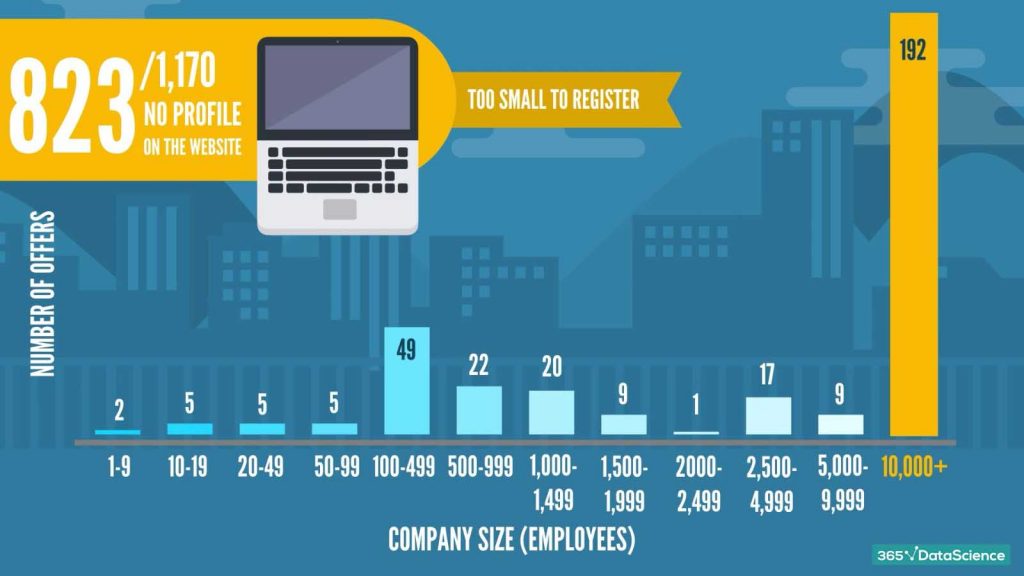
It’s easy to see that the majority of job offers come from very big companies, with more than 10,000 employees. This could significantly skew our data towards the necessities of big corporations. However, looking beyond that, 823 of the total 1,170 job offers were posted by companies that didn’t actually have a profile on the website. Therefore, their size hasn’t been determined and is not present in the chart.
With that in mind, we can assume that bigger companies tend to register on more employment websites, while their smaller counterparts do not engage as much. So, these 823 offers could have been made by companies small enough to not register.
But what about the offers themselves? Let’s analyze this!
What are the locations of the data scientist job descriptions in our study?
The data scientist job descriptions we studied originated from 38 states in the US. Here are the top 12: California, Virginia, Washington, New York, Massachusetts, Maryland, Texas, Colorado, Michigan, Ohio, New Jersey, and Florida.
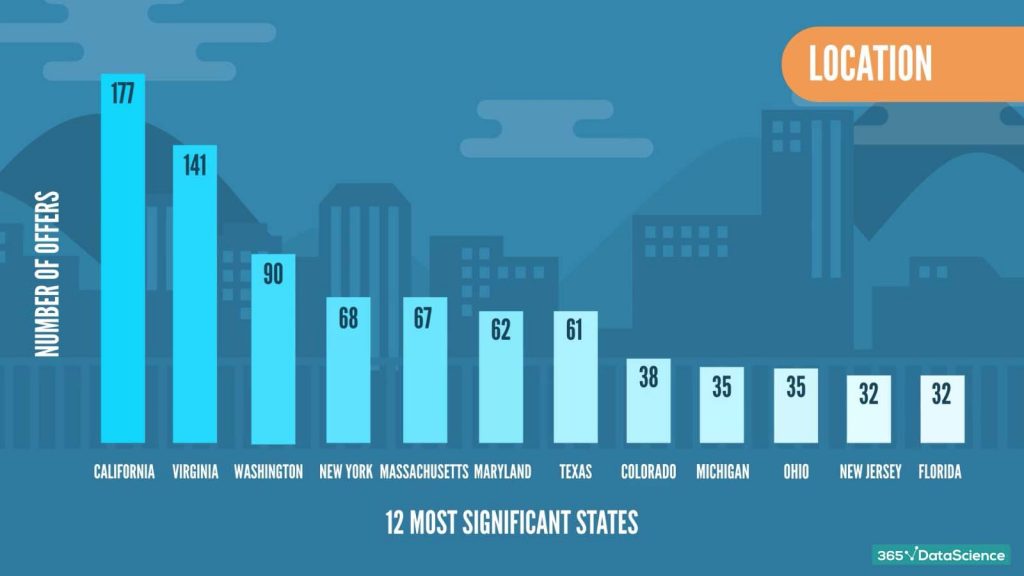
And here are the same states highlighted on a map:
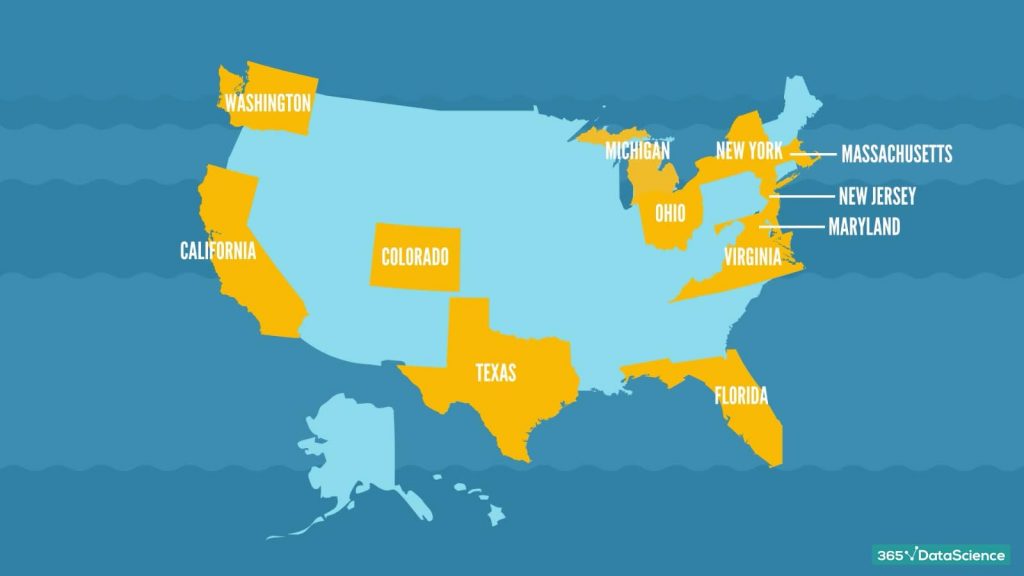
Now that you have a good idea about the top states by number of offers, let’s move on to the job requirements.
What is the required education in data scientist job descriptions in 2020?
When it comes to education, 544 job offers stated that they require at least a Bachelor’s degree, 367 – a Master’s and 50 were looking for a Ph.D. While at the same time in 209 job offers, the level of education was not stated.
As for the preferred fields of study, here are the results. We collected the data by extracting only the first three mentioned fields. Data science takes the lead, followed by Statistics, Mathematics, Computer Science, and Engineering. IT, Economics, and Physics are much less popular, according to the numbers.
Author’s note: If you have a degree in Computer Science or Economics and you want to learn how to make the switch to data science, check out our dedicated blog posts on Transitioning to Data Science from Computer Science and Transitioning to Data Science from Economics.
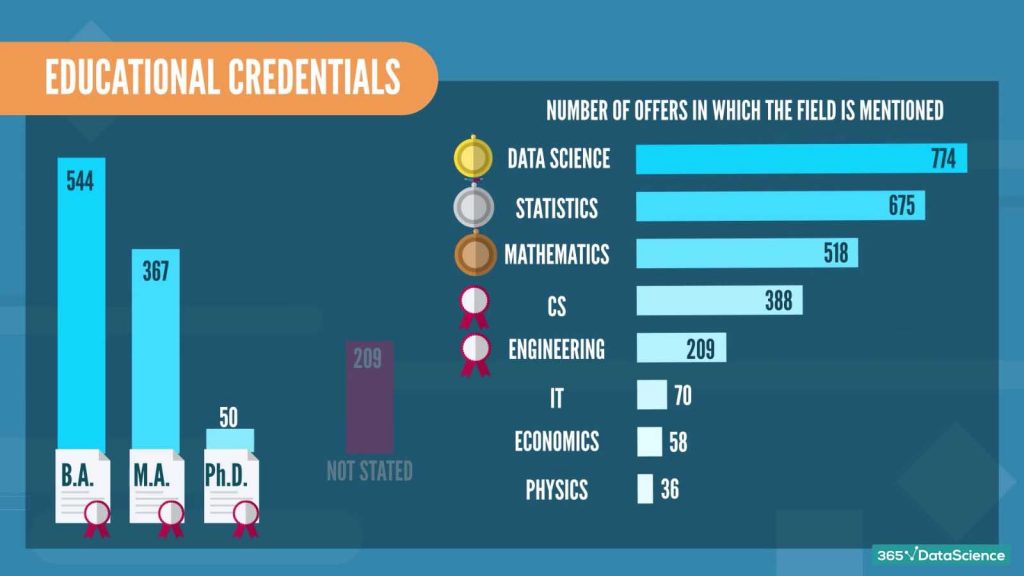
What is the required work experience in data scientist job descriptions in 2020?
We set the years of experience in these 2 categories: ‘years of experience as a data scientist’ and ‘general work experience.’ Bear in mind that in most job offers, general work experience should be in a related field.
What we found out is that on average companies demand that candidates have at least 4.2 years of previous experience as a data scientist and 5.2 years of experience in related fields.
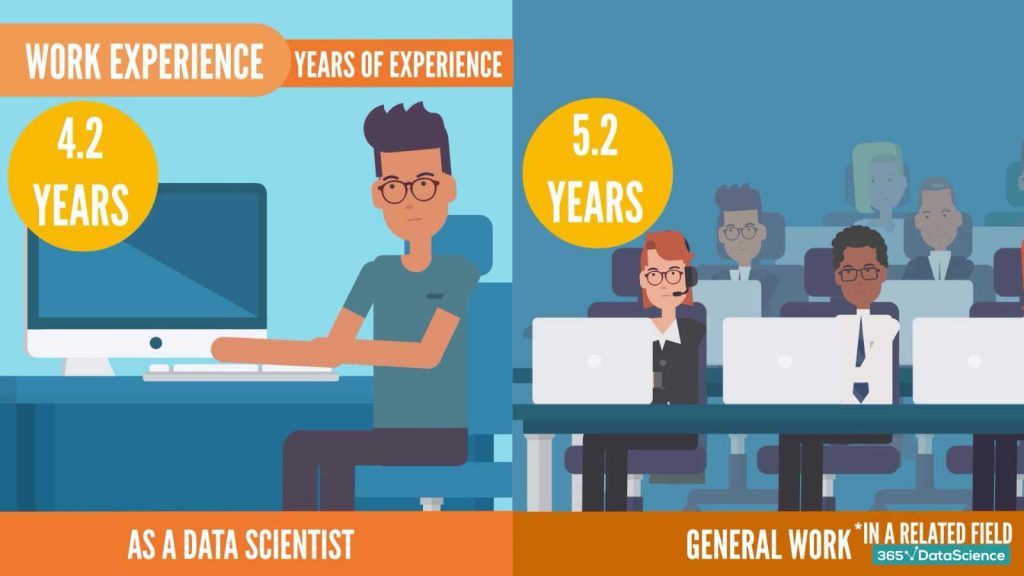
Which are the required programming languages in data scientist job descriptions in 2020?
Here are the most quoted programming languages in the 1,170 job offers (there may have been more than one language per offer):
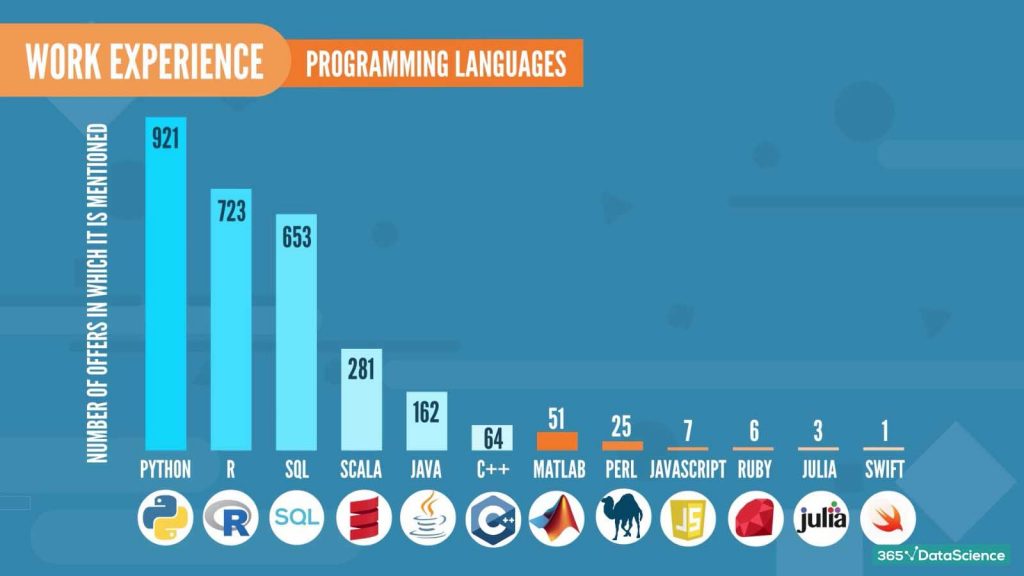
No big surprises here – Python is the most popular one, as expected, followed by R and SQL. The other languages with a significant number of mentions are Scala, Java, and C++.
What are the most cited skills and machine learning techniques in data scientist job descriptions?
We also performed a keyword analysis on the description of the job offers and extracted the most cited skills and machine learning techniques.
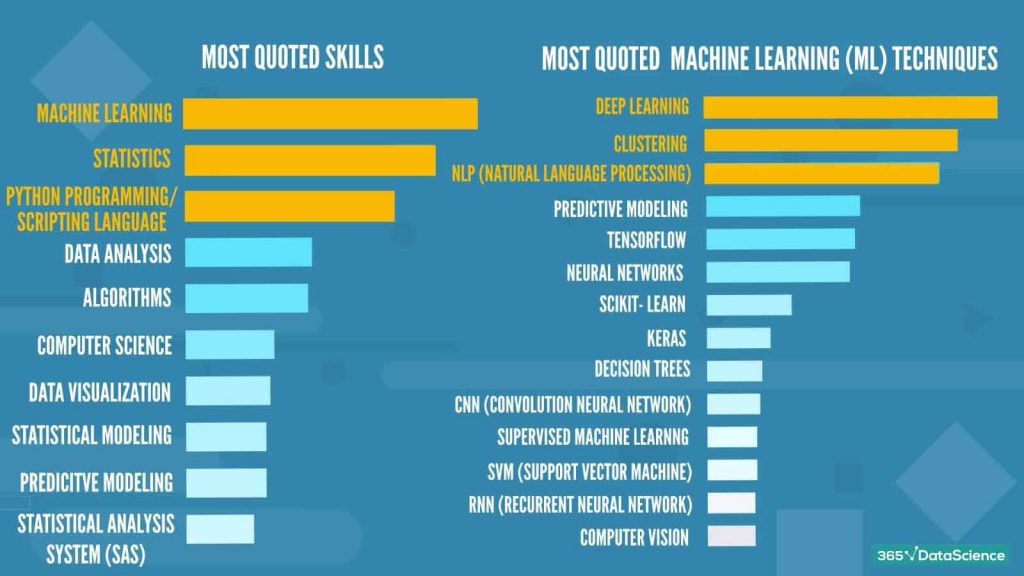
As expected, the most important skills to have are Machine Learning, Statistics, and Python programming, while the most in-demand machine learning techniques are Deep Learning, Clustering, and Natural Language Processing (NLP).
Which are the most quoted database/cloud skills, and data visualization techniques in data scientist job descriptions?
The last parameters we extracted were Database/Cloud skills, data visualization techniques, and whether there is an emphasis on communication or not.
The numbers show you should definitely consider adding Spark, AWS, or Hadoop to your data scientist toolbelt.
Regarding data visualization, it all comes down to Tableau and Power BI. Tableau was mentioned in 228 job offers, whereas Power BI in 79.
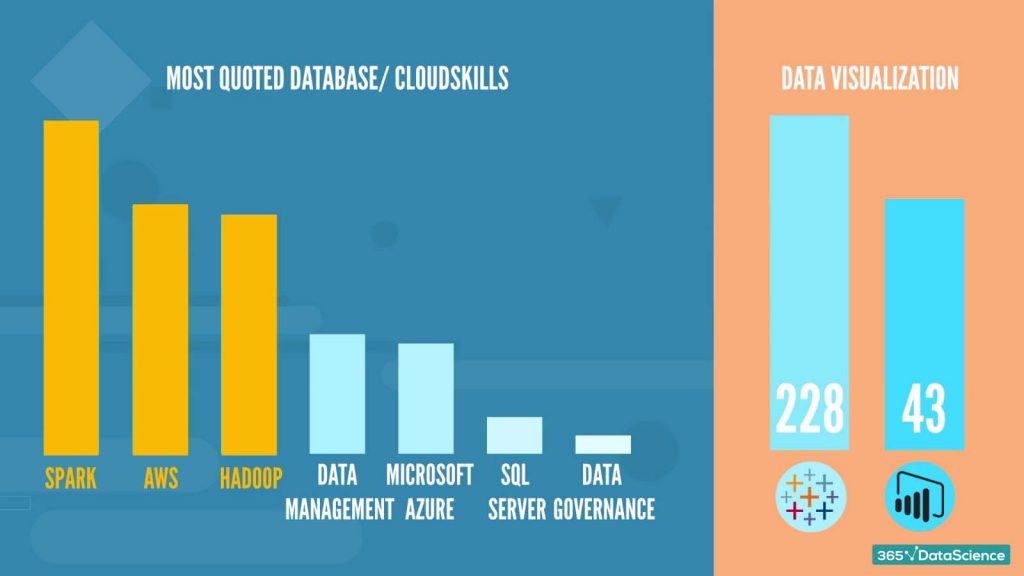
Are communication skills of major importance in data scientist job descriptions?
That was true in 368 offers, while in the rest 802 there was no mention of communication or teamwork at all.
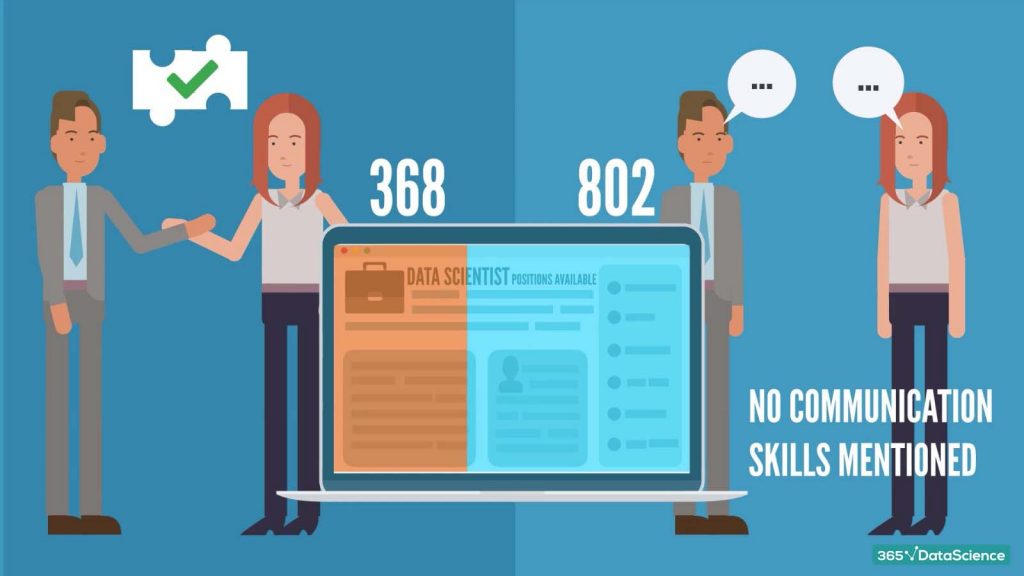
Now, let’s analyze the prior work experience with respect to the education required in data scientist job offers.
Here is what we found:
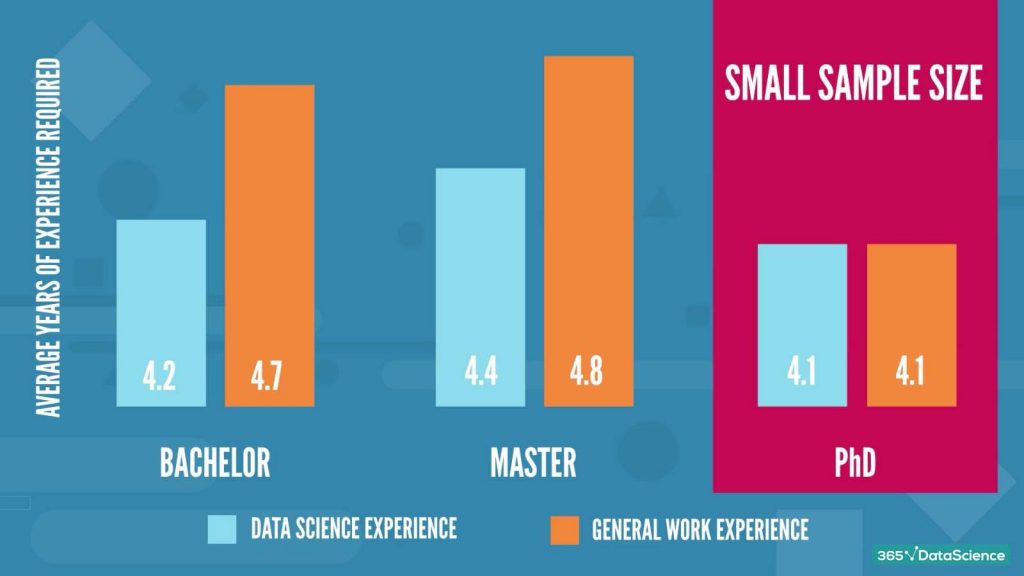
As you can see, there is no real significant difference between the preferred work experience for the different degrees. However, there are two very important factors to consider here:
- The sample size is not large, especially for the Ph.D.
- This data applies to candidates with a degree that is the minimum requirement. In fact, there were no job postings that did not require university education. As in any other industry, holding a Ph.D. lowers the minimum required experience. However, not dramatically so, especially having in mind that a Ph.D. takes several years to complete.
So, let’s look at how the company size affects the experience required in data scientist job offers.
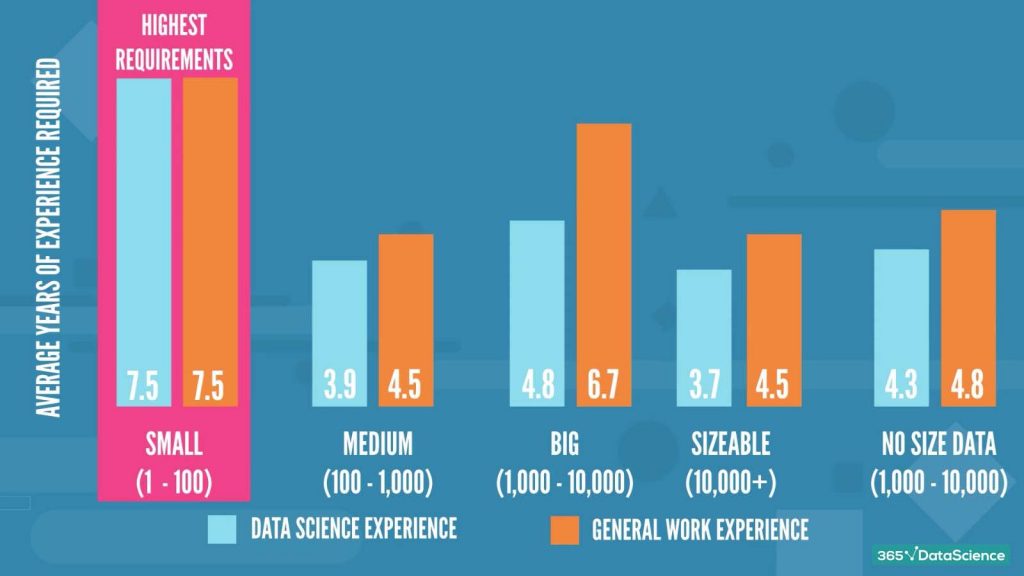
For this analysis, we have grouped the companies into 5 categories: small (1 – 100 employees), medium (100 – 1,000 employees), big (1,000 – 10,000 employees), sizeable (10,000+ employees), and those with No size data. It is very important to remember that the sample size here is rather small.
Quite surprisingly, it looks like the smallest companies have the highest requirements for experience. Apart from the sample limitation, we can assume that smaller companies have a limited number of employees. So, to expand and become successful, it needs more experienced professionals. The sizeable companies, in contrast, may not necessarily need an experienced individual but someone they can train to become a useful tool for the company in the future.
And we’ve arrived at the last piece of analysis – what companies of different sizes require as a level of education in data scientist job descriptions.
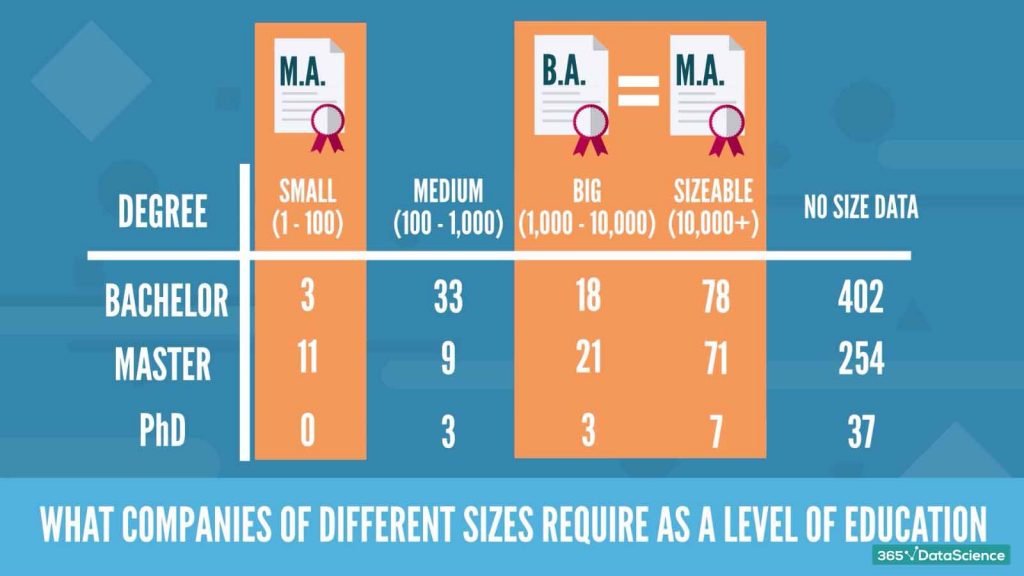
Due to the small samples, we have decided to summarize the data in a table, rather than a graph. Smaller companies don’t really look for Ph.D.s and prefer Master’s degree holders. At the other end of the spectrum, the bigger companies have somewhat more balanced requirements with an approximately equal number of positions asking for either a Bachelor’s or a Master’s degree.
That was our compelling look at a sample of 1,170 job offers for the position of data scientist.
We hope you will find this information useful and advantageous for you in your path to landing your dream data scientist job.
Ready to take the next step towards a data science career?
Check out the complete Data Science Program today. Start with the fundamentals with our Statistics, Maths, and Excel courses. Build up a step-by-step experience with SQL, Python, R, Power BI, and Tableau. And upgrade your skillset with Machine Learning, Deep Learning, Credit Risk Modeling, Time Series Analysis, and Customer Analytics in Python. Still not sure you want to turn your interest in data science into a career? You can explore the curriculum or sign up for 12 hours of beginner to advanced video content for free by clicking on the button below.
#Career, #DataScience
#365datascience #DataScience #data #science #365datascience #BigData #tutorial #infographic #career #salary #education #howto #scientist #engineer #course #engineer #MachineLearning #machine #learning #certificate #udemy
No comments:
Post a Comment